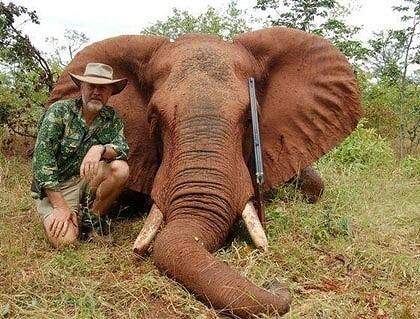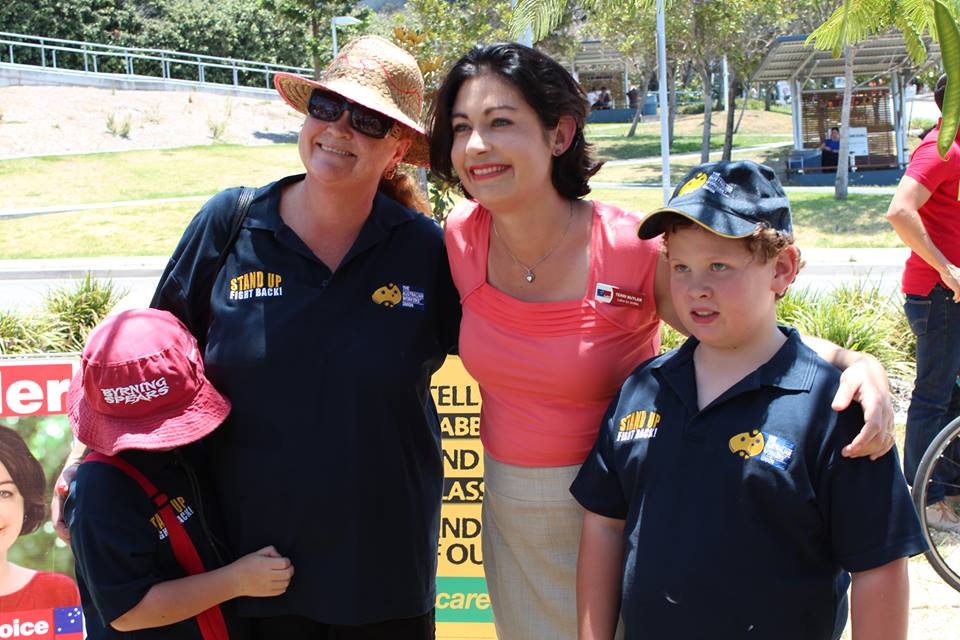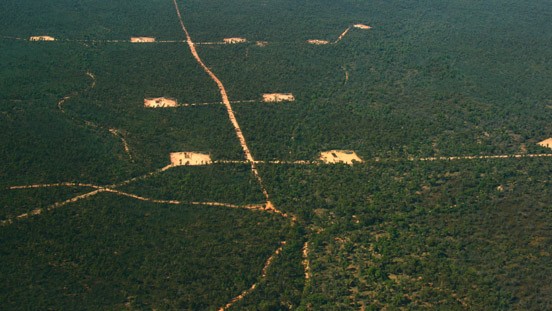By Errol Brandt @e2mq173
From Left Field
27th January 2014
Shocking images, like the one above, are circulating again through social media. They are part of a grassroots campaign to draw attention to trophy hunting, the business of hunting African animals for sport.
The image above is particularly powerful. It depicts a happy family crouched in front of a dead elephant, which is still chewing his last mouthful of food. The image is real and available in the gallery of Frikkie du Toit Safaris website.
My first reaction on seeing this image was to condemn this family as cruel and barbaric. I struggle to understand what possible enjoyment one could derive from shooting an elephant.
Then I wanted to understand why anybody would pay for this gruesome experience.
After a basic web search, I started to find some answers. Social media has identified the hunter in the photograph as Gregory S. Willis, a doctor who works in Philadelphia, USA. This led me to a blog post that Dr Willis had written to describe his experience:
I raised my.470 Nitro Express, aimed for his brain and squeezed the trigger. Just before I pulled the trigger, he slightly turned his nose up. The big slug hit him just below the brain. He turned and then, as if I had been doing this forever, remembering Frikkie’s instruction, I smashed his hip with the second barrel. Frikkie also shot as I requested him to do if the bull did not drop from the first shot. His shot centered the heart. Man! Can Frikkie shoot! I reloaded and ran with my PH to the bull’s side and quickly put another 500-grain Hornady solid into his brain. I never felt the double’s substantial recoil.
The Cheeky One By Gregory S. Willis, DO
According to the website that hosts his photographs, Dr Willis probably paid more than $30,000 for his adventure. The full price list for trophy hunting experiences is available here.
Not long after finding the image of Dr Willis, I came across another. This time it was of NSW Shooters Party MP Robert Borsak, showing him with an elephant that he had shot in Zimbabwe.
Mr Borsak also wrote about his adventure on a blog post entitled Bulls in the Rain.

NSW MP Robert Borsak
Not being a hunter, I find it hard to understand how anybody could shoot animals for sport, let alone write what to me are gruesome stories describing the event. So, rather than meekly expressing my outrage by simply retweeting the images, I realised I needed to know more about the issue, and set about finding some answers.
I started by emailing both Dr Willis and Mr Borsak for their comments about their African hunting experiences.
Both men responded to my email.
Dr Willis provided a short statement that said: “I will respectfully refer you to contact organizations such as Safari Club International, Dallas Safari Club and the various nature conservation governmental agencies and legal/law enforcement authorities of all countries involved in your research.”
Mr Borsak was even more helpful and provided a considerable amount of material that helped me put this image in its wider context.
Although social media might like to portray both men as cold-blooded thrill-seekers, after reading through the information they suggested, I’m surprised to find there is much more to this story.
Trophy hunting is a legitimate legal business in South Africa and many African countries. It aims to create revenue and economic incentives for management, conservation of wildlife, and provide support for local communities. Advocates for trophy hunting argue that the hunt operators are ‘conservationists first and hunters second’. Through creating an economic incentive for conservation, trophy hunting can encourage local communities to recognise the value of the wildlife thereby aligning the interests of conservationists and locals.
Glen Martin, author of Game Changer: Animal Rights and the Fate of Africa’s Wildlife, argues that Kenya, which banned hunting in 1977, has seen a 70 percent decrease in wildlife in the past 25 years. Eco-tourism appears not to have delivered the economic or conservation benefits that were promised and illegal killing of wildlife continues regardless. Mr Martin contrasts the approach taken by Kenya with that of Namibia and argues that Namibia’s use of trophy hunting has successfully delivered economic and conversation benefits. Audio from Mr Martin’s interview on Radio National in 2012 is available here and is well worth downloading.
Importantly, where trophy hunting is managed poorly, it can have significant negative ecological effects. These include altering the age and sex balances within populations, social disruption, deleterious genetic effects and population decline. It can also be difficult to ensure that financial benefits from hunting go towards conservation activities.
The League Against Cruel Sports argues that less than 5 percent of the fees go back to the government in these cases. Even if the government had the resources for appropriate monitoring, corruption and incompetence make the quotas almost impossible to enforce.
The moral question against trophy hunting is raised by American political philosopher and a professor at Harvard, Michael Sandel. He argues that the problem is not that we operate a market economy, the problem is that we are becoming a market society. The idea that everything can be ‘for sale’ is becoming entrenched into our social values.
Markets are not moral; just because we can sell something doesn’t mean we should. We consider it morally repugnant to buy or sell something which devalues the product or service being brought or sold. For example, we cannot sell our bodily organs; a market in organs might induce people to consider the homeless, vulnerable or the sick to be ‘worth’ no more than the value of their harvested organs. This leads to a devaluation in human life. Similarly, it is illegal to buy and sell our votes because that market would corrupt our basic democratic processes.
Does a market in killing wildlife ultimately lead to the wildlife itself being devalued? Or does the evidence show that killing a small number of animals actually supports the overall objective of animal conservation? This is a complicated question that requires data and evidence to answer.
It was significant that both D. Willis and Mr Borsak mentioned conservation in their responses. They genuinely believe they have contributed to the preservation of wildlife. Strangely enough, both ‘sides’ of this discussion appear to want the same thing!
Admittedly, I still find these images very disturbing; I simply cannot understand the enjoyment that comes through hunting. However, I believe that sharing graphic images on Twitter or Facebook and demonising hunters does nothing to deliver real outcomes for conservation in Africa. It focuses anger and hatred towards those who may, paradoxically, be actually contributing to conserve wildlife.
I don’t know the answer, but it is clear this is a complicated issue in a world in which our wildlife is rapidly disappearing. An objective assessment of the evidence may find that trophy hunting is, indeed, the only practical way that wildlife can be preserved, for now. In the longer term, the solution may also require raising the standard of living in Africa, enforcing stronger penalties against poaching and seriously discussing the vexed issue of population growth.
This is not an issue that can be understood on a Facebook status update or a 140-character message on Twitter. Sharing a gruesome image is easy: understanding the underlying issues takes time and commitment to an enormous and heartbreaking issue.
Well-intentioned efforts on social media might actually be having the the opposite effect. By focussing on graphic images and not on the facts, we lose sight of the problem that we’re trying to solve. The battle against trophy hunting might be won, but the war against wildlife extinction might be lost.
Nobody, not least the trophy hunters, wants to see that happen.
Further reading
| Chalton McCallum Safaris |
| Elephant Conservation Hunting |
| IUCN SSCPrinciples |
| Markhor Conservation |
| Game Changer: Animal Rights and the Fate of Africa’s Wildlife |












The social media campaign is to raise awareness in a graphic way and get the issue on the agenda. I don’t see the problem with this if what is portrayed is true.
However the article changes tack – from understanding motivation to consequences and goals.
So about the motivation. We find ways to channel our rage – from playing Angry Birds (those black bomb birds are so satisfying) to trophy hunting. As Mark Dapin pointed out in a piece in the SMH if you have ever felt the glow of triumph over someone else you understand the motivation of the person delivering a king hit. These aren’t comfortable things to explore.
HI Evan – thanks for your comments as always.
It’s true that the social media campaign does raise awareness, but for what? Is it raising awareness of poaching, government corruption or sustainable development – or is it simply vilifying the hunters?
You are quite right about finding way to channel our rage. In this case, I’m wondering whether channelling our rage at individuals through social media is actually the right thing to do.
Hi Errol, I think that is the next stage in the campaign – the ‘so you can do this’: boycott trophy hunting, write to this pollie, boycott these products, and so on.
My guess is that channelling rage at individuals is usually wrong and ineffective (not always perhaps, but mostly). Systems shape people as well as people shaping systems; it is usually the system that needs to be changed I think.
Hi Errol – like you, I don’t get how people can enjoy this activity (or any killing) as sport, but I did not know the broader context. What I hate about the images circulating on social media, especially twitter, is that they rarely give readers a clue about what they could do, for example, by providing the addresses of government agencies or Ministers to write to about their concerns. The images just go around and around it seems and people express horror, but do little else. The same pics pop up month after month.
It is always good to get behind the issues, so thanks for your work.
I would be no more disgusted seeing a happy family grinning, standing over a pile of a dozen dead Borsaks. After all, it would be for a good cause in helping to deal with the massive human overpopulation problem, while taking out problematic ‘rogue humans’.
No doubt someone would be able to make plenty of money guiding hunts for these ‘rogue humans’ – there’s certainly no shortage – and then capitalist ‘trickle down’ economic principles would likewise apply to benefit everybody else, right?
I read ‘elephant conservation hunting’ above, and have read more of Borsak’s attempts to disguise his lust for killing as socially beneficial, witness the hunting in NSW state forests and now National Parks. Quite possibly he actually believes – has to believe – that slaughtering species clearly more intelligent and ‘moral’ than his own is a goodness. It’s a sickness, probably incurable without very intensive therapy, and then there are plenty waiting to replace every cured ‘top dog’. Sad.
Oh Errol…I can’t believe the mild mannered way in which you’ve written about this issue!
KILLING FOR SPORT IS WRONG…
Make the hunters eat their kill, then maybe they can justify their lust.
What’s missing in these peoples brains?
Honestly, I can understand poachers motivation as they’re attempting to make a living with which to feed themselves and their families. Not that I condone their actions either,.. It’s like comparing stealing to vandalism, stealing is a means to an end, senseless destruction on the other hand?
Compare this to an issue that’s got a lot of air at the moment, the drunken violence on our streets any given weekend.
How are those F**kwits any different to a gun-toting “doctor”? HMMM?
Thanks Richard. I hear you, but the issue that I’m worried about is animal conservation – not the outlawing of hunting for sport. That’s where I think the social media discussion is going in the wrong direction.
In November 2013, we learned that the Western Black Rhino was declared extinct and two other Rhino species are dangerously close. The more time we spend talking about the ethics of hunting is time that we’re not spending on animal conservation. Believe me, I find those pictures disgusting and abhorrent as the next person, but the situation is so dire that it’s worth looking at all the options and using evidence to help us make the right decisions.
Killing a small number of animals to achieve a greater good might well be the only answer we have left… how sad is that.
You would trust a Zimbabwean official to ensure no disruption to the herd? I wouldn’t trust anyone from the Mugabe Government. So therein lies just one problem. The Mugabe government would ‘legally’ let you slaughter every animal in the country provided he and his hangers on get their cut. As a conservation measure, this would not be advisable.
Re the people who think killing animals is fun – they are very grateful for the conservation issue, as it justifies their bloodlust. That bloodlust that comes from the thrill of the chase, tracking animals and shooting them dead with a single shot. Or, the bloodlust that comes from having someone else find you a wild animal to kill, set you up at a safe distance with a powerful rifle, and do your killing for you when you screw it up.
I can’t blame the Africans for thinking of a new income stream (or any income stream!), but don’t ask me to respect the people who go out and kill the animals.
I would no doubt be charged with murder if I were to give my intentions on animal killers known
To use Kenya as your example of where a hunting ban hasn’t worked is, given your other comments, taken out of context. You cannot just look at the hunting ban in Kenya without looking at its economic situation as a whole. Any ban will only work if it can be enforced and there is enough trained people to enforce it. Poaching and the Ivory trade has been illegal for years yet until it is enforced it will continue. Many ivory poachers in Kenya actually originate from where “hunting safaris” are legal and no doubt use the legal slaughter of elephants to “launder” their poached ivory. It is not surprising the two you corresponded with used the conservation argument, they were probably advised to use it at the safari. Wonder if the doctors’ patients would have the same viewpoint?